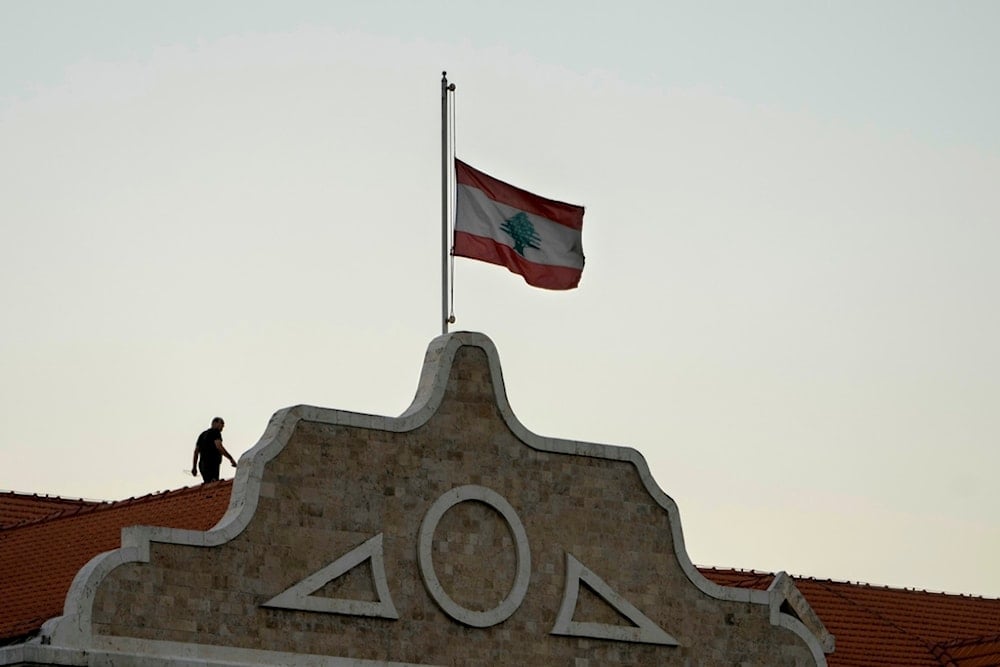Ceasefire hinges on 'Israel' after Lebanon agreed to US proposal
US special envoy Amos Hochstein is expected to arrive in Beirut this week to discuss outstanding issues with Lebanese officials.
-

The Lebanese flag flies at half-mast at Lebanon's government palace following the death of Hezbollah leader Sayyed Hassan Nasrallah in Beirut, Lebanon, Sept. 29, 2024. (AP)
The Lebanese government has signaled broad support for a US-proposed ceasefire to end the ongoing Israeli aggression on Lebanon, sources told AFP on Monday.
"We have made a lot of progress. Lebanon has a very positive view on this proposal," a Lebanese official told AFP, adding that final remarks on the wording of the draft are being prepared.
US special envoy Amos Hochstein is expected to arrive in Beirut on Tuesday to discuss outstanding issues with Lebanese officials.
Despite this progress, Israeli officials have yet to formally respond to the US truce plan. US State Department spokesperson Matthew Miller confirmed Monday that Washington has shared proposals with both the Lebanese and Israeli leadership.
"Both sides have reacted to the proposals... There has been an exchange of ideas aimed at achieving the full implementation of Resolution 1701," Miller told reporters.
Read more: 'Israel' targets paramedics in continued aggression on Lebanon
Khalil confirms reports, says ceasefire hinges on Israeli response
At a later time, Ali Hassan Khalil, Lebanese Member of Parliament and top political aide to Nabih Berri, was cited by Reuters saying that Lebanon, including Hezbollah, agreed to a US proposal for a ceasefire regarding the Israeli aggression on Lebanon, marking what he described as the most serious effort yet to end the ongoing war.
Khalil confirmed to Reuters that Lebanon submitted its written response to the US ambassador to Lebanon, Lisa A. Johnson.
"Lebanon presented its comments on the proposal in a positive atmosphere," Khalil said, without elaborating on the details. He emphasized that all Lebanese comments align closely with UN Security Council Resolution 1701.
Khalil stressed that the success of this initiative now hinges on "Israel's" response, warning, "If Israel does not seek a solution, it could create 100 problems."
Khalil also criticized "Israel’s" intensified bombardment of Beirut and its southern suburb, accusing it of negotiating "under fire." He stated firmly, "This won't affect our position."
Efforts underway
The US and France have reportedly been leading efforts to broker a ceasefire amid fears of a broader regional conflict. Lebanese officials have described the US proposal as a significant step toward de-escalation.
The proposed truce centers on enforcing UN Resolution 1701, which calls for the withdrawal of armed groups from southern Lebanon and the cessation of hostilities.
However, achieving compliance remains a challenge, as "Israel's" determination to dismantle the Lebanese Resistance poses a significant obstacle.
Earlier in the day, Israeli Prime Minister Benjamin Netanyahu stated that "Israel" will continue its military offensive against Hezbollah even if a ceasefire agreement is reached in Lebanon.
"The most important thing is not (the deal that) will be laid on paper... We will be forced to ensure our security in the north (of Israel) and to systematically carry out operations against Hezbollah's attacks... even after a ceasefire", to keep the Resistance from regrouping, Netanyahu said before the Knesset.
Observers say the Lebanese government's endorsement of the truce proposal marks a step forward, but the lack of a formal Israeli response leaves uncertainty.
Hochstein's visit to Beirut this week is expected to be pivotal in clarifying the details and addressing lingering concerns.
Read more: Hezbollah missiles pummel Tel Aviv, numerous wounded, killed

 3 Min Read
3 Min Read








